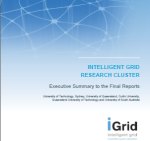A report from the Intelligent Grid Research Cluster (iGrid) says decentralised energy generation, such as that provided by PV solar power systems, has the potential to defer or reduce expenditure on transmission and distribution networks.
The Australian Government’s Draft Energy White Paper was clear on one issue – the nation needs to sink a ton of cash into upgrading its electricity infrastructure. Perhaps it doesn’t have to cost the $240 billion mentioned by Energy Minister Martin Ferguson, nor include what would appear to be one of his favoured technologies – nuclear power.
The Intelligent Grid Cluster is a major collaborative research venture between the CSIRO and the university sector; including University of Technology, Sydney, University of Queensland, Curtin University, Queensland University of Technology and University of South Australia – led by the Institute for Sustainable Futures.
The group has has explored the economic, environmental and social impacts of a large scale rollout of smart grid technologies in Australian electricity networks.
Cluster Leader Professor Stuart White said Australia’s electricity grid has not changed a great deal in the last 100 years and the research shows how to create a grid that meets the needs of this century, while moving towards a low-carbon future.
According to the executive summary of the report, approximately 33% of the network investment projected to occur in Australia between 2010 and 2015, or $15 billion, is considered by the research group to be potentially avoidable if growth in demand is eliminated through a range of measures. These measure include a focus on distributed electricity generation; which includes solar panel systems.
The iGrid report states introduction of decentralised energy can defer or avoid altogether the construction of new infrastructure and provides an attractive alternative approach to addressing peak load growth. The findings state decentralising electricity generation is a viable option for not only delivering significant carbon emissions reductions and slashing costs, but also securely and reliably meeting the energy needs of consumers.
Far from being a massively complex set of measures to incorporate, the three-year multi-disciplinary research project found decentralising electricity generation, introducing smart technologies in the electricity grid, improving energy efficiency and managing demand are effective measures “within easy reach”.
The 51-page Executive Summary Report can be downloaded here (PDF).












































